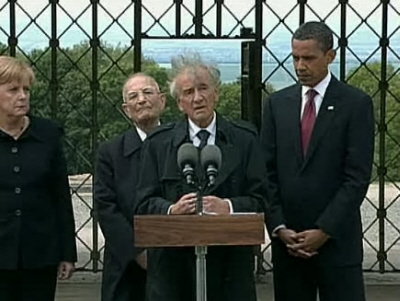[AUTHENTICITY CERTIFIED: Text version below transcribed directly from audio]
Mr. President, Chancellor Merkel, Bertrand, ladies and gentlemen:
As I came here today it was actually a way of coming and visit[ing] my father's grave. But he had no grave. His grave is somewhere in the sky. This has become in those years the largest cemetery of the Jewish people.
The day he died was one of the darkest in my life. He became sick, weak, and I was there. I was there when he suffered. I was there when he asked for help, for water. I was there to receive his last words. But I was not there when he called for me, although we were in the same block; he on the upper bed and I on the lower bed. He called my name, and I was too afraid to move. All of us were. And then he died. I was there, but I was not there.
And I thought one day I will come back and speak to him, and tell him of the world that has become mine. I speak to him of times in which memory has become a sacred duty of all people of good will -- in America, where I live, or in Europe or in Germany, where you, Chancellor Merkel, are a leader with great courage and moral aspirations.
What can I tell him that the world has learned? I am not so sure. Mr. President, we have such high hopes for you because you, with your moral vision of history, will -- will be able and compelled to change this world into a better place, where people will stop waging war -- every war is absurd and meaningless -- where people will stop hating one another; where people will hate the otherness of the Other rather than respect it.
But the world hasn't learned. When I was liberated in 1945, April 11, by the American army, somehow many of us were convinced that at least one lesson will have been learned -- that never again will there be war; that hatred is not an option; that racism is stupid; and the will to conquer other people's minds or territories or aspirations, that will is meaningless.
I was so hopeful. Paradoxically, I was so hopeful then. Many of us were, although we had the right to give up on humanity, to give up on culture, to give up on education, to give up on the possibility of living one's life with dignity in a world that has no place for dignity.
We rejected that possibility. And we said, "No, we must continue believing in a future, because the world has learned." But again, the world hasn't. Had the world learned, there would have been no Cambodia and no Rwanda and no Darfur and no Bosnia.
Will the world ever learn?
[I] think that is why Buchenwald is so important -- as important, of course, but differently as Auschwitz. It is important because here the large -- the big camp was a kind of international community. People came there from all horizons -- political, economic, cultur[al]. The first globalization essay, experiment, were made in Buchenwald. And all that was meant to diminish the humanity of human beings.
You spoke of humanity, Mr. President -- though unto us, in those times it was human to be inhuman. And now the world has learned, I hope. And of course this hope includes so many of what now will be your vision for the future, Mr. President: a sense of security for Israel; a sense of security for its neighbors, to bring peace in that place. The time must come. It's enough -- enough to go to cemeteries, enough to weep for orphans -- it's enough. There must come a moment, a moment of bringing people together.
And therefore we say anyone who comes here should go back with that resolution. Memory must bring people together rather than set them apart. Memories here not to sow anger in our hearts, but on the contrary, a sense of solidarity that all those who need us. What else can we do except invoke that memory, so that people everywhere will say the 21st century is a century of new beginnings, filled with promise and infinite hope, and at times profound gratitude to all those who believe in our task, which is to improve the human condition.
A great man, Camus, wrote at the end of his marvelous novel, The Plague: "After all," he said, "after the tragedy, never the rest...there is more in the human being to celebrate than to denigrate." Even that can be found as truth -- painful as it is -- in Buchenwald.
Thank you, Mr. President, for allowing me to come back to my father's grave, which is still in my heart.
 Book/CDs by Michael E. Eidenmuller, Published by
McGraw-Hill (2008)
Book/CDs by Michael E. Eidenmuller, Published by
McGraw-Hill (2008)
Page Updated: 1/3/24
U.S. Copyright Status: Text and Audio = Uncertain.

